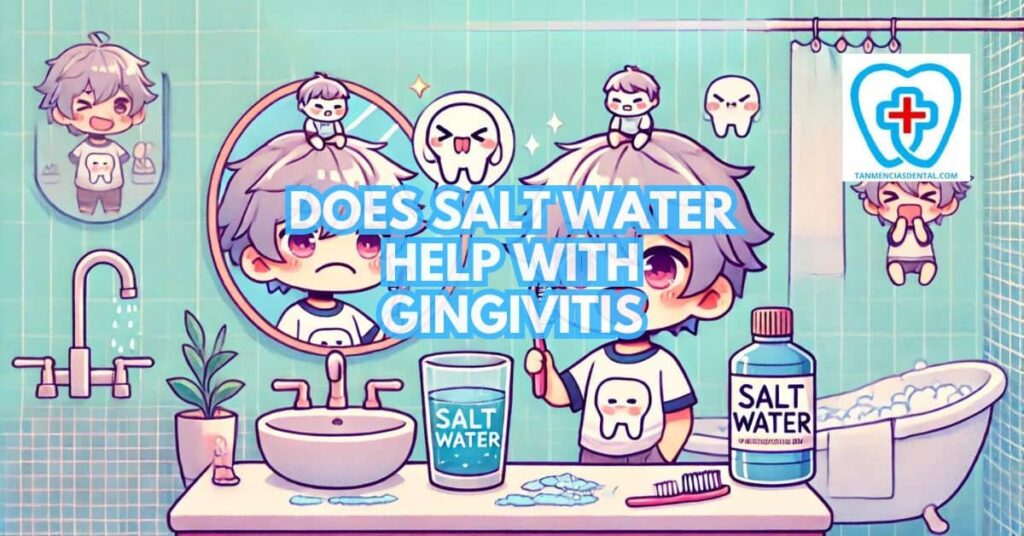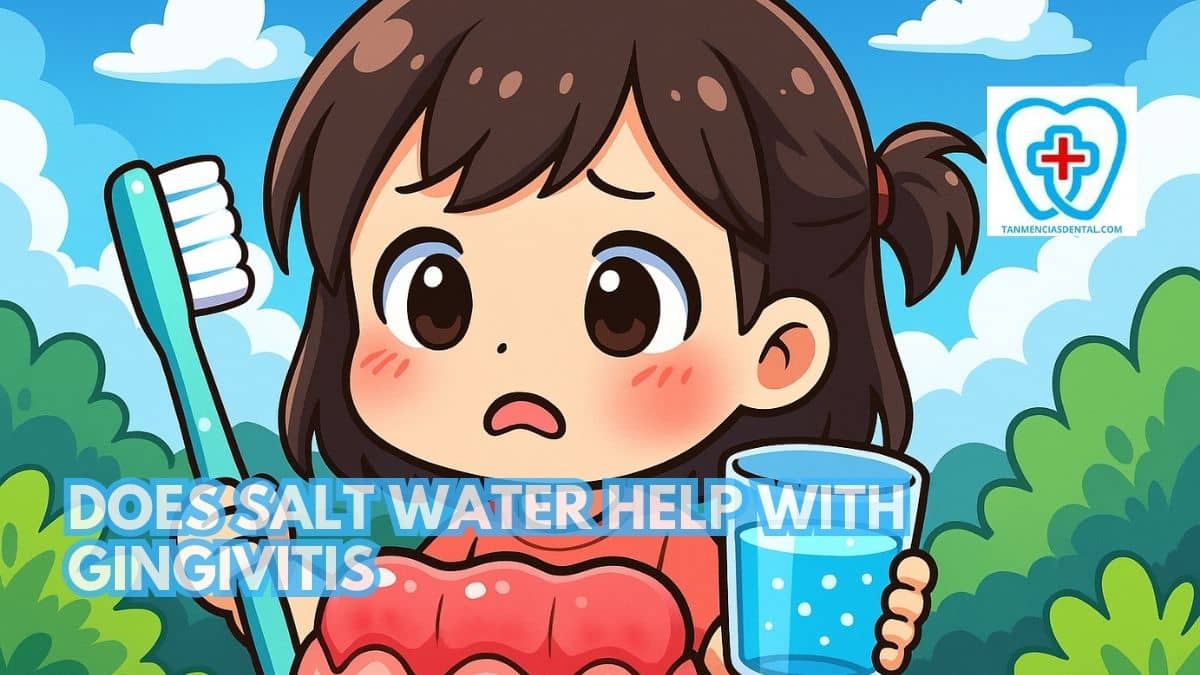Gingivitis is the earliest stage of gum disease and often begins with red, swollen, or bleeding gums.
It develops when plaque builds up along the gum line and irritates the tissue.
Many people look for simple remedies to ease these symptoms, which raises the question: Does salt water help with gingivitis?
Salt water rinses are widely used at home because they can reduce swelling and make the mouth feel cleaner.
Understanding how salt water works, its benefits, and its limits can help you decide if it should be part of your gum care routine.
1. The Bacterial Battle in Your Mouth: How Plaque Leads to Gingivitis
Plaque is a soft, sticky film composed of bacteria, food particles, and saliva that forms on the teeth.
When not removed through regular brushing and flossing, plaque hardens into tartar, which can only be removed by a dentist.
The bacteria in plaque produce toxins that irritate the gums, causing inflammation and swelling.
This inflammatory response is the body’s way of fighting off the bacterial infection, but it leads to the symptoms of gingivitis.
If left untreated, gingivitis can progress to more severe gum disease or periodontal disease, which can result in gum infection and damage to the bone supporting the teeth.
Over time, this can cause receding gums, expose the roots of the teeth, and increase sensitivity.
Understanding the role of plaque in gingivitis highlights the importance of maintaining good oral hygiene to prevent gum disease and protect your oral health.
🦷 Can You Drink Sparkling Water After Brushing Your Teeth?
2. Soothing the Inflammation: Can Salt Water Help Reduce Gum Inflammation?
Saltwater rinses are a simple and common home remedy for calming gum inflammation caused by gingivitis.
When used correctly, the salt helps draw out extra fluid from the tissues, which can reduce swelling and bring relief to swollen gums.
This effect not only eases discomfort but also makes brushing and flossing less painful.
Salt water also has mild antiseptic properties that lower the number of bacteria in the mouth, which can support healing.
Using a saltwater rinse regularly can give short-term relief from the bleeding and irritation linked to gingivitis.
Still, it should be viewed as a helpful addition to daily oral care rather than the only treatment for gum problems.
🦷 Why Be a Dental Assistant? It’s More Than Just Smiles!
3. DIY Salt Water Rinse: A Simple Home Remedy for Gingivitis
Creating a salt water rinse at home is simple and inexpensive.
Mix half a teaspoon of salt into a cup of warm water until the salt is fully dissolved.
Rinse your mouth with the solution for about 30 seconds, then spit it out.
This rinse can be used up to three times a day to help soothe irritated gums and reduce inflammation.
Consistent use of a salt water rinse can support other dental hygiene practices in managing and alleviating the symptoms of gingivitis.
🦷 How Smile Correction Can Transform Your Confidence and Appearance
4. The Benefits of Salt Water for Oral Health: From Reducing Bacteria to Easing Discomfort
Salt water provides several benefits for oral health, especially for people who are trying to manage gingivitis.
It works by reducing the amount of bacteria in the mouth, which lowers the chance of infection and irritation.
With fewer bacteria present, plaque is less likely to build up on the teeth and gums, helping them stay healthier.
Saltwater rinses also soothe sensitive tissue, easing the pain and tenderness that often come with gum inflammation.
This calming effect can make it easier for people to brush and floss without causing further discomfort.
When used consistently, a saltwater rinse can be a simple and effective way to support strong teeth and gums as part of a daily care routine.
🦷 Chewing Gum Instead of Brushing Teeth: Can Gum Really Save the Day?

5. Risks of Using Too Much Salt Water Rinse
Using salt water to rinse your mouth is safe for most people, but doing it too often can cause problems.
Excessive rinsing can cause the mouth to feel dry and uncomfortable.
It may also irritate gums that are already sore from gingivitis.
Dentists usually suggest limiting salt water rinses to two or three times a day.
Knowing when to stop helps protect your gums while still getting the soothing benefits of salt water.
🦷 Brushing Up on Prevention: Can Tooth Decay Be Reversed or Only Prevented?
6. Brushing Up on Good Oral Hygiene: The Foundation of Healthy Gums
Maintaining good oral hygiene is essential for preventing and managing gingivitis.
This includes brushing your teeth at least twice a day with fluoride toothpaste and using a toothbrush with soft bristles to avoid damaging the gums.
Flossing daily helps remove food particles and plaque from between the teeth and along the gum line.
Regular dental checkups and professional cleanings are also crucial for keeping your gums healthy.
Together, these practices form the foundation of good oral health and are key to preventing gum disease.
🦷 Why Brushing Your Teeth At Night Is More Important Than You Think
7. Salt Water Rinse vs. Mouthwash: Understanding Their Roles in Gum Health
While both salt water rinses and mouthwashes can benefit gum health, they serve different purposes.
Salt water rinses are excellent for reducing inflammation and providing temporary relief from gingivitis symptoms.
Mouthwashes, on the other hand, often contain additional ingredients like fluoride and antiseptics that offer broader protection against plaque and cavities.
Using both as part of your oral care routine can help ensure comprehensive gum health.
It’s important to understand the strengths of each to use them effectively.
🦷 How Long Does It Take To Treat Gingivitis?
8. Limitations of Salt Water Rinses: When to See a Dentist for Gingivitis Treatment
While salt water rinses can be helpful, they are not a cure for gingivitis.
Persistent or severe symptoms of gum disease require professional dental care.
If you experience prolonged gum bleeding, significant swelling, or pain, it is essential to see a dentist.
Professional treatments can include deep cleaning, antibiotics, or other interventions that are more effective than home remedies.
Recognizing the limitations of salt water rinses helps ensure you get the appropriate care when needed.
🦷 Can You Recycle Electric Toothbrushes?
9. Beyond Salt Water: Additional Home Remedies for Gingivitis
In addition to salt water rinses, several other home remedies can help manage gingivitis.
Hydrogen peroxide rinses can reduce bacteria and whiten teeth, while aloe vera gel can soothe inflamed gums.
Oil pulling with coconut or sesame oil may also reduce plaque and improve gum health.
Incorporating a diet rich in vitamins C and D can support gum health and boost your immune system.
These remedies, combined with good oral hygiene, can provide comprehensive support for managing gingivitis.
🦷 How to Choose the Best Antibacterial Toothpaste for Gingivitis That Really Works
10. The Science Behind Salt Water: How It Works
Salt water works by creating a hypertonic environment in the mouth, which helps draw out excess fluid from inflamed gum tissues.
This process, known as osmosis, reduces swelling and discomfort.
Additionally, the salt increases the pH balance in the mouth, making it less hospitable for bacteria to thrive.
These antibacterial properties help reduce the overall bacterial load in the mouth, supporting healthier gums.
Understanding these mechanisms clarifies why salt water rinses are effective for temporary relief of gingivitis symptoms.
11. Preventing Gum Disease: Keeping Your Smile Healthy
Preventing gum disease involves more than just treating symptoms; it requires a proactive approach to oral health.
Regular brushing and flossing, combined with routine dental checkups, are the cornerstones of prevention.
Avoiding smoking, eating a balanced diet, and managing stress also play crucial roles in maintaining gum health.
These habits help keep your immune system strong and reduce the risk of developing gingivitis.
A comprehensive approach ensures long-term gum health and a bright smile.
🦷 Expert Oral Care Services in Marikina City
👨⚕️ Conclusion
Salt water rinses can offer significant temporary relief from the symptoms of gingivitis, such as inflammation and discomfort.
However, they should not be viewed as a cure-all solution.
Maintaining good oral hygiene and seeking professional dental care when needed are essential for effectively managing and preventing gum disease.
While salt water is a helpful addition to your oral care routine, it is most effective when used alongside other preventative measures.
Ensuring a balanced approach to gum health will keep your smile healthy and vibrant.
😊 Self-Promotion
Visit Tan-Mencias Dental Clinic in Parang, Marikina City, for top-notch dental care with a friendly touch.
Our dedicated team is here to ensure your smile stays bright and healthy.
Have questions or need to book an appointment?
Call us at 9171451074, message us on Facebook, or use our website’s contact form.
We look forward to helping you achieve your best smile!
❔ FAQs
1. How often should I use a salt water rinse for gingivitis?
It is usually safe to use a salt water rinse two to three times a day.
Using it more often can dry out your mouth or irritate your gums.
Always spit out the rinse and avoid swallowing it.
2. Can salt water cure gingivitis on its own?
No, salt water cannot cure gingivitis.
It may reduce swelling and discomfort, but it does not remove plaque or tartar.
Professional dental care and good daily oral hygiene are needed to fully treat gingivitis.
3. Is a salt water rinse safe for children?
Salt water rinses can be safe for older children if they can swish and spit without swallowing.
Younger children may have trouble spitting out the solution and should avoid this practice.
It is best to check with a dentist before starting.
4. What kind of salt should I use for a rinse?
Regular table salt works fine for a rinse.
Some people prefer sea salt, but both are effective as long as the salt is fully dissolved in warm water.
Adding too much salt can irritate, so keep the solution mild.
5. When should I see a dentist instead of relying on salt water rinses?
You should see a dentist if your gums bleed often, remain swollen, or feel painful even after using a rinse.
Persistent bad breath or loose teeth are also signs of a more serious problem.
Salt water can help with symptoms, but only a dentist can provide full treatment for gum disease.

